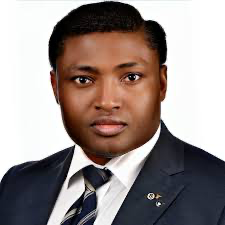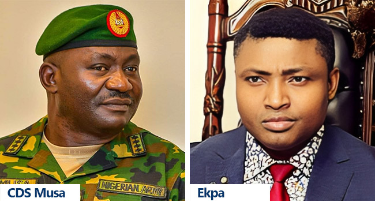The Chief of Defence Staff, General Christopher Musa, has leveled serious accusations against Finland, alleging that the country is providing protection to Simon Ekpa, who claims to be the Prime Minister of the proscribed Indigenous People of Biafra (IPOB). General Musa’s strong words came during his appearance at a military conference held in Abuja to commemorate Nigeria’s 25th Democracy Day.
During his address, General Musa expressed deep concerns over the ongoing activities of IPOB in the South-East region of Nigeria. He emphasized the urgent need for the arrest and prosecution of Simon Ekpa, highlighting the impact of Ekpa’s actions on the stability and security of the region.
“We have repeatedly complained about the issue of Simon Ekpa. He is in Finland and the Finnish Government is giving him all the support and he is doing what he is doing,” Musa stated. He did not mince words in expressing his frustration over the perceived inaction from the Finnish authorities. “The comments he is making, people are being killed and nothing is being done. This is democracy. If the European Union is supporting democracy and this is happening and they are not taking action, then they don’t mean well for Nigeria.”

General Musa’s remarks underscore a growing sense of urgency within the Nigerian government to address the challenges posed by IPOB. He called for decisive action, urging the Nigerian authorities to explore diplomatic avenues to put an end to Ekpa’s activities. “We have said that in clear terms. We need to diplomatically find means of getting him out of whatever it is that he is doing. He must be arrested, he must be prosecuted.”
Drawing a parallel to illustrate his point, General Musa questioned the response of European nations if the roles were reversed. “Look at it from the other way, assuming he is in Nigeria, he is doing that to the Finnish government, you think the European Union will allow that to happen? They definitely will not.”
The speech by General Musa highlights the broader geopolitical and diplomatic implications of the situation, suggesting that Nigeria expects its international partners, particularly those championing democracy, to support its efforts in combating separatist activities. The appeal to the European Union and other democratic nations to take action against individuals inciting violence from abroad reflects Nigeria’s frustration and the need for global cooperation in addressing such transnational challenges.
As the Nigerian government continues to grapple with the complexities of regional security and separatist movements, General Musa’s call to action serves as a poignant reminder of the interconnected nature of global security and the necessity for international collaboration in upholding democratic values and ensuring peace.




